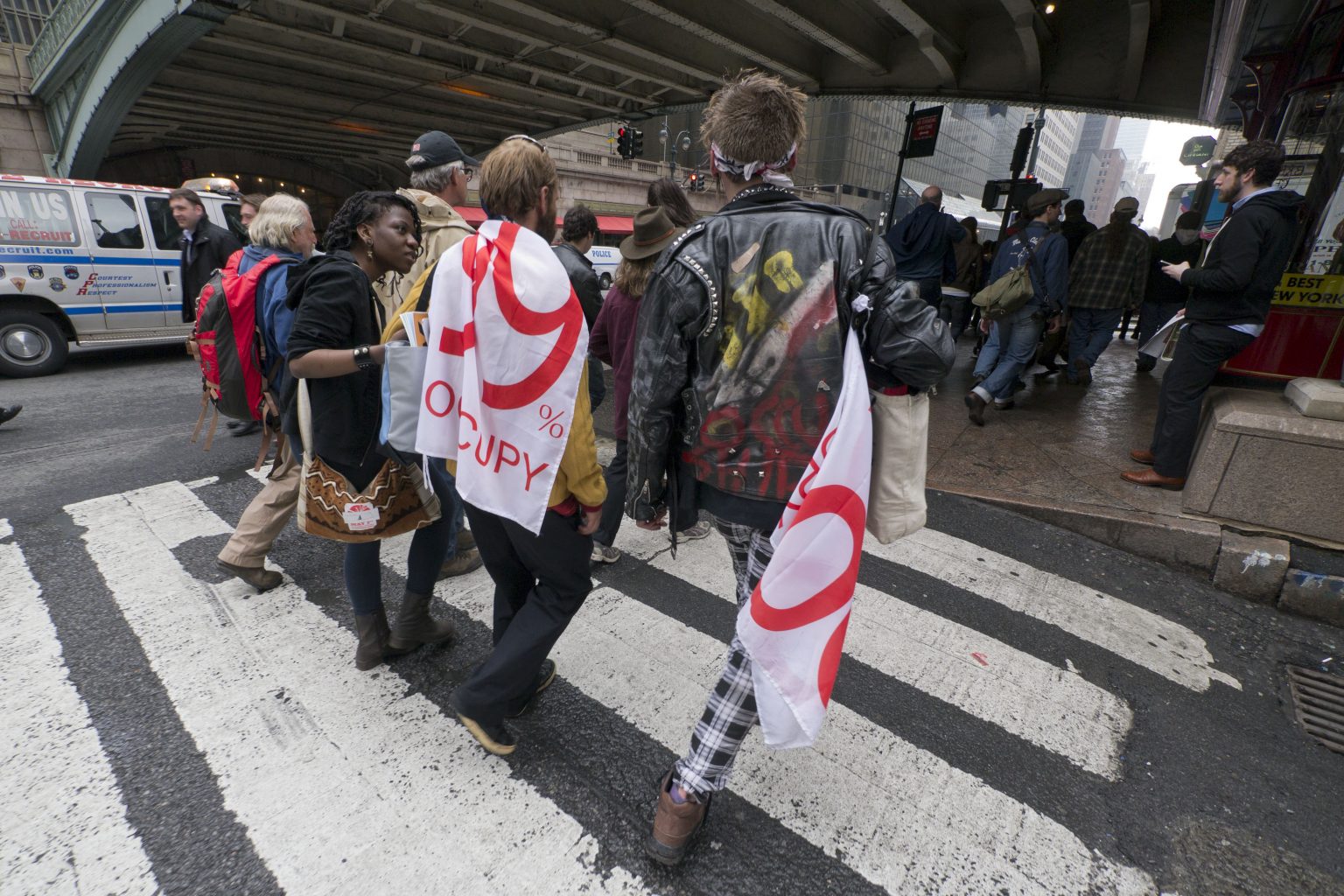Over the last decade, economic leftism emerged as a real threat to the neoliberal capitalist consensus, as seen in both Occupy Wall Street and the two Bernie Sanders presidential campaigns. But almost as soon as it began, this leftist insurgency failed. Why? Because left populism was unable to fully distinguish itself from neoliberalism, and therefore could not achieve the escape velocity needed to establish a new common sense, imagine a new horizon, and open up a coherent collective vision. People know that they aren’t being paid what they are worth, that their work is alienating, and that there are enough resources to go around for everyone to live a dignified life. This “common sense” constantly seeks to assert itself, but the primacy of identity and personal narrative have obscured the much more determining category of economic class.
Neoliberalism—the present political project of the capitalist class—was a response to the New Deal era of reform, and was designed to claw back those concessions made for the common good. It relies first and foremost on the deregulation of big business, the lowering taxes on corporations and the wealthy, and the financialization of the economy (i.e. banks gaining an outsized influence over the entire economy and society, something that was not the case until the second half of the 20th century). This has produced one single unsurprising result—the greatest transfer of wealth from the bottom to the top in American history during that period. Since neoliberalism can be described as a regressive ideology (unshackling multinational corporations from regulations, handing control over our society and economy to a few massive, corrupt banks, slashing taxes on corporations and the rich, and wreaking profound damage to the ecological, social, and economic health of our world) it is imperative that it portrays itself as progressive in order to maintain control.
The kind of neoliberalism that the Clintons, Barack Obama, and Joe Biden represent can best be described as “progressive neoliberalism”—a canny political style that emphasizes personal narrative, slogans, and identity, while studiously downplaying class and material relations. This has created a feeling of progress and change, without the reality.
Progressive neoliberalism creates spaces for these personal narratives—monologuing stories about individual identity. Such “safe spaces” are free from negative inputs, in effect protecting them from messages or content created outside its parameters. But this safety mechanism works both ways—just as nothing gets in, nothing gets out, either. Such discourse is therefore inherently insular and cannot be heard or understood by a wider audience in any meaningful way. As a result a disconnect between it and the actual public grows.
In this way, we may be able to connect and share our stories, but they are only ever that: our own stories. Any larger structural or material analysis is left at the door. Progressive neoliberalism has turned the left into a series of monologues, “Telling Your Story”, rather than a dialogue. The only role for other people here is to “Do the Work” of being imposed upon by the storyteller. Telling Your Story and Doing the Work is an artificial dialogue that the ruling class uses to create the illusion of understanding, collectivity, and progress, when it in fact creates none of the above.
Just as slogans offer “changeless change,” a focus on identity offers “disconnected connection.”
Increased connection and exchange of narratives can only ever undermine a popular left. The politics of Hillary Clinton, Warren, and even Ocasio-Cortez are centered on their personal stories. For example, Obama’s unique personal journey was the entire basis of his successful 2008 campaign. And in fact, if one listens to any given AOC stump speech one will find her speaking more about her background than anything else.
The most visible radical liberals and democratic socialists—AOC, “The Squad,” Warren—have taken full advantage of story discourse to build their brands. These brands are themselves promoted through the deployment of catchy slogans: Abolish ICE, Open Borders, and so on. Such actors, to quote Paolo Friere, prefer “to substitute monologue, slogans, and communiques for dialogue,” and thereby “attempt to liberate the oppressed with the instruments of domestication.” Sloganeering creates the illusion of change without the change itself—and changeless change ensures the continued dominance of progressive neoliberalism.
Just as slogans offer “changeless change,” a focus on identity offers “disconnected connection.” Identity, as philosopher Franco Berardi says, “is inherently limiting of the possibility of comprehension and interaction.” Identity seems like a universal category—after all, we all have identities. But, as Berardi notes, identity does not lend itself to comprehension or interaction, and therefore cannot achieve actual universality.
In this way—through emphasis on personal narrative, slogans, and identity—progressive neoliberalism offers empowerment. This is one of their key buzzwords. But empowerment is not the same as liberation. The goal of liberation is the creation of a new person—one who is no longer oppressor nor oppressed—by restoring the humanity of both. In contrast, empowerment is an effort to turn the oppressed into the oppressors themselves. Empowerment without first liberating the oppressors and the oppressed from the dehumanizing effects of injustice will only further perpetuate injustice.
Progressive neoliberalism, with its stories and slogans, cannot communicate or connect with a mass base that can achieve political success. Any politics that emphasizes notions like “problematic people” will never be a successful popular politics, because popular politics is about changing reality, not changing individuals.
The oppressors forget, says Freire, “that their fundamental objective is to fight alongside the people for the recovery of the people’s stolen humanity, not to ‘win the people over’ to their side. Such a phrase does not belong in the vocabulary of revolutionary leaders, but in that of the oppressor.” In other words, winning people over, creating justice in the hearts and souls of the people, making politics about slogans and monologues, is oppression, not liberation.
Instead of the liberation of left populism, we have ended up with the empowerment of neoliberalism. The powers that be preach the gospel of empowerment because they want to empower you to submit to the system, rather than liberating you from it. It is about the appearance of radicalism, with stirring identity monologues and sweeping slogans concealing the underlying reality of these as control mechanisms for limitation and domestication. The ruling class wants us to change our language so that we don’t change our reality. They want us to connect, share stories, and empower ourselves—to create the illusion of progress—while the world gets worse around us.
If class is not fully recognized and conceptualized as a determining category in political and media discourse, then the exploitative material conditions that the mass of people experience every day will be made to feel even more natural and inevitable. A true populist left needs to break away from the focus on identity, storytelling, slogans, and empowerment to achieve real liberation and a new collective vision. Rather than dismissing them as receptacles for monologues or irredeemable deplorables, the left must engage in dialogue with all oppressed peoples.









